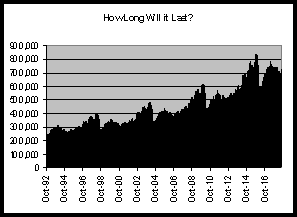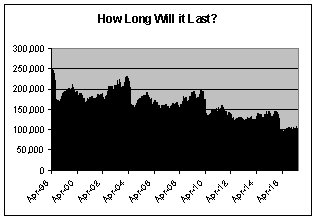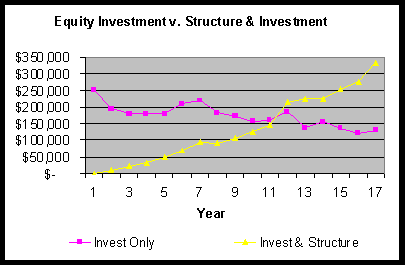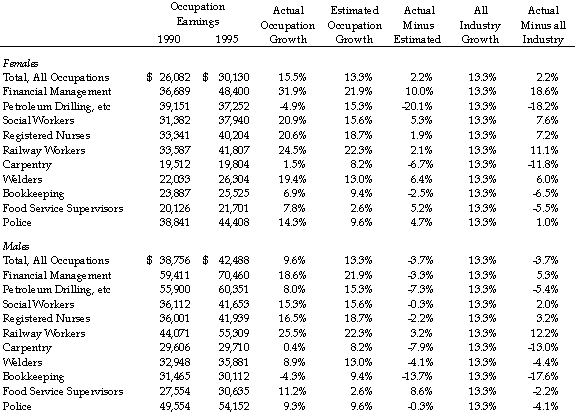by Scott Beesley
This article was originally published in the winter 1998 issue of the Expert Witness.
Note that this article is the first of a two-part article. You will find part 2 here
Under the Fatal Accidents Act, it is only the dependants of the deceased who can claim for loss of income. The recent Alberta Court of Appeal decisions in Galand and Duncan, however, have created the possibility that the Survival of Actions Act may be used to allow the estate to claim for loss of income.
A fundamental debate triggered by this interpretation of the Survival of Actions Act concerns the size of the “lost years” or “necessities” deduction. This concept arises from that class of personal injury cases in which the plaintiff has suffered a reduced life expectancy. In such cases, one portion of the award derives from the income that would have been earned in the years beyond the (now) reduced lifespan, i.e. in the “lost years.” In this calculation, a deduction is made to account for the fact that some expenses will not be incurred, once the plaintiff dies.
This is the original lost years deduction. The net amount left after that deduction represents, in principle, spending from which the plaintiff would have received pleasure or enjoyment. Note that while there is still room for debate about the appropriate size of this deduction (and it seems not to be a settled issue), the rationale for an award is very clear: The plaintiff has been severely injured, such that their expected survival is now reduced, but during their remaining years they can obtain pleasure from an award which replaces some of their lost income.
A fatal accident can be thought of as an event which results in a life expectancy of zero, i.e. as the limiting case of a reduced expectancy. Yet for any significant remaining life expectancy (beyond a few days or weeks?) these situations are fundamentally very different, and there is no reason why the lost years deduction in the two types of cases should be the same. One can only note that the award in a reduced life expectancy case should certainly be at least as large as a deterrence-driven award in an equivalent fatal case.
In the case of Survival of Actions Act claims, the intriguing fact is that the Court of Appeal made its precedent-setting decisions without stating any underlying rationale. Why should a claim continue when no survivors exist? Why should even a reduced claim, with a lost years or necessities deduction applied, continue? The traditional view, which obviously still has many adherents, suggests that indeed it should not continue, since to allow such claims would provide windfall gains to those who would not otherwise have benefited from the earnings of the deceased. The only obvious rationale for the continuance of these estate claims is deterrence and/or punishment, and I believe that does provide a sufficient rationale for such claims.
Each year, thousands die in traffic accidents in Canada, and to that we can add hundreds more in industrial mishaps and other types of accidents. The pain, grief and economic damage done is enormous, as are the health-care costs involved. One might also argue that the present system leaves parents and siblings under compensated for the loss of a family member, since in many cases children assist their relatives, and in particular the deceased might have helped his or her parents as they aged. It seems odd that if one victim had a spouse and three children, and another was single, the amount payable by the defendant’s insurer was (historically) very significant in the former case and negligible in the latter. Yet the negligence involved was the same, the annual income lost was the same, and the economic loss to society (usually a productive worker) was the same. If we wish to deter reckless driving, and careless behaviour in other areas of life, then it appears there should be consistent penalties for similar wrongs. At one extreme of opinion, this would imply virtually the same award in the two cases given, and no necessities deduction at all.
In the alternative, it has been suggested that a very large deduction should apply, with virtually all the projected spending of the deceased being deducted. The arguments advanced for this viewpoint have focussed on the “no windfall gains” argument, either by making that case directly or by citing precedents which in turn rely on that idea. This amounts to implying that deterrence should be only a minor consideration, and that compensation is to be the overriding standard in the determination of any award. This argument is often made by defendants, and the typical conclusion is that only lost savings should be awarded, or equivalently (as noted above), all consumption spending should be deducted. The sum calculated roughly estimates the present value of what the deceased would have left to his or her heirs, had there been any, which is often very little in current dollars.
I am unaware of any article or judgement that argues from first principles why all consumption spending should be excluded. In each case the discussion turns on interpretation of prior judgements with a view to justifying as small an award as is possible. I believe, in fact, that one would be hard pressed to find a rationale which supported any particular scale of deduction, because the balancing of the idea of no windfall gains with that of deterrence is inherently subjective. The extremes are pleasantly clear: Award nothing (deduct it all) if you virulently oppose windfall gains, and award all lost income (deduct nothing) if you want to put all the emphasis on deterrence.
(Like any economist, I should note that theory would say we should somehow tabulate the costs of accidents and the cost of prevention, and minimise overall social costs. But this in itself is extremely difficult, and very sensitive to assumptions which vary with the beliefs of the investigator. Further, minimising social costs would require knowing how people would react to each possible level of deterrence, and we cannot easily predict such behaviour. Finally, the problem cannot be converted to one of mathematics without assessing the intrinsic value of a life, and I for one would argue that lifetime income alone would provide too low a weighting in such a calculation.)
In Duncan, Justice Kerans provided some guidance regarding the size of the deduction, and the ration-ale involved. Note the following statement: “My life-savings would not tell one what I spent during my life on pleasure, as opposed to what I had to spend in connection with the earning of my income”. He referred also to the correct deduction as the “expenses that the victim would have incurred in the course of earning the living we predict he would earn” (emphasis added). The difficulty is that these phrases still leave enormous room for argument. Do they infer that only whatever is required to stay alive is to be deducted, since all other spending produces some pleasure? Perhaps a somewhat higher deduction is implied, assuming that success in a particular career path requires a certain standard of dress and even lifestyle. If Justice Kerans had written “expenses that the victim would have incurred in order to earn the living we predict he would earn,” then, clearly, a relatively minimal deduction would apply. But as written, it is not clear, for example, whether income which would have supported a family in the future is to be viewed primarily as a necessary expense (and deducted) or as something which would have provided pleasure (and should under some interpretations be compensated). Perhaps in another case it will be apparent that the deceased would never have married. Does that then imply much greater spending on him or herself, and again is that spending counted in the award or deducted? It is asking a lot of the courts to assess the marital prospects (and chance of divorce) of each fatal accident victim, if it is found that such considerations should be analysed in every case. Justice Kerans, referring again to the amount of the deduction, noted (in Duncan):
…That sum will vary with the kind of employment, and the state in life of the victim. Neither “poverty-line” expenses nor “lost savings” are a reliable indicator of that sum. Rather, it should be a fair calculation of the likely future cost of lives.
With respect, I note that the second amount Justice Kerans refers to (lost savings) should actually be described as “all expenses except savings,” since that is what is argued for by those who wish to minimise awards. (Most people involved in these cases know the respective positions of those at the extremes of the debate, but the quote as it is may confuse anyone new to the topic, so a clarification seems in order.) The idea that the deduction will vary with the state in life of the victim is at odds with the idea that the deduction reflects necessities, strictly defined, since the latter would not vary with income. If the deduction is to change with income, then should it be a fixed percentage, or some other form of variation? Should any other variables matter? The answer depends entirely on the rationale which is eventually settled upon.
After canvassing a number of alternative methods for calculating this deduction, in Duncan, Justice Kerans settled on an approach which he attributed to Constance Taylor, the plaintiff’s counsel. This method, which Justice Kerans refers to as the “available surplus” approach, was first enunciated in the U.K. Court of Appeal in Harris v. Empress Motors [1983] 3 All E.R. 561 and later adopted in one of the first Canadian cases concerning the “lost years deduction,” Semenoff v. Kokan (1991) 84 D.L.R. (4th) 76. In the latter case, the court concluded that the “conventional deduction” was 33 percent of before-tax income. But Justice Kerans also suggested that the income taxes the deceased would have paid should form part of the deduction, and he concluded:
…Cases suggest a discount of 50% to 70%. My sense of the matter is that this is an apt range. But I suggest that expert evidence could help the judge to assess this cost. The plaintiff actuary here did no calculation. He instead accepted 50% or that “suggested by the cases”. Again, that calculation should include one for tax.
Justice Kerans, then, appears to be suggesting a discount of 50 to 70 percent of before-tax income (i.e. composed of 30 to 40 percent in tax and, presumably, 20 to 30 percent for necessities). Note that for Albertans at average income levels, income tax is lower than Justice Kerans suggested, at approximately 25 percent of gross income. Using a necessities deduction at the midpoint of Justice Kerans’ range, 25 percent, the implied total deduction is 50 percent of before-tax income.
We note also that Justice Kerans explicitly rejected an approach which awards only lost savings, stating:
…The flaw in the “lost savings” approach is that it is heir-centred, not victim-centred. It asks what the heirs lost, not what the victim lost. But the suit here is not for the loss to the estate, it is a suit by the victim for his loss, a claim that by operation of statute survives his death and can be made by his estate for him. Worse, it has the air about it of an attempt to undermine the statute. As a result of this flaw, the approach will fail to take into account what has been called “discretionary” spending, like holidays and entertainment and other “treats”. It will also fail to take into account gifts to children and spouses, and thereby underestimate even an heir-centred award.
Finally, if it is eventually decided that only savings will be awarded in these cases, it should be realised that an accurate definition of savings should include the principal component of mortgage payments, as well as financial and capital asset accumulation. We note that the Harris decision cites another English case, Sullivan v West Yorkshire Passenger Transport Executive, which used a savings-only award but (in my view correctly) included mortgage principal payments in assessing the relevant percentage.
Case Review
I cited earlier a quote from Duncan in which Justice Kerans implied that spending which would have provided pleasure is to be compensated. Assuming that expenditures which are necessary for the maintenance of life do not provide “pleasure,” restitution implies that compensation is to be provided only for that portion of income which remains after the deduction of necessities. A clear statement of this principle is found in Toneguzzo-Norvell v. Burnaby Hospital [1994] 1 S.C.R. 114 where Madam Justice McLachlin concluded at page 127:
…There can be no capacity to earn without a life. The maintenance of that life requires expenditure for personal living expenses. Hence the earnings which the award represents are conditional upon personal living expenses having been incurred. It follows that such expenses may appropriately be deducted from the award.
The deduction used in Toneguzzo was 50 percent of before-tax income, a figure confirmed by the Supreme Court of Canada.
I note that the dispute would not be resolved by any clearer statement that pleasure is to be compensated, while necessities are not, since the line between the two is subjective. Is one car a necessity, a pure luxury beyond transit, or something in between? How much of spending on food provides pleasure? Housing? And so on through virtually all common purchases. Only a few luxury items, gifts, expensive vacations etc. seem to clearly have no necessities component, while conversely almost every ordinary expense for an average income person contains an element of pleasure (i.e. a component of cost which is the excess over the “necessities-only” equivalent). In defending a large deduction, what is implied is that either there is no pleasurable component in ordinary spending, or (and this seems to be the case) that pleasure lost is not what is being compensated. What is being replaced, according to Duncan, is what would have been the deceased’s “available surplus.” As mentioned above, Justice Kerans suggested that a 50 to 70 percent total deduction seemed correct, and after adjusting for his slight overestimation of tax, a 40 to 60 percent range results. The implied surplus is the remaining amount, roughly “60 to 40” percent, of before-tax income. Alternatively, one can deduct estimated tax and then deduct another 20 to 30 percent of before tax-income for necessities. We can compare the roughly 50 percent (from before-tax) deduction implied in Duncan with the figures cited in other cases (below).
A March 20, 1997 judgement from the Alberta Court of Queen’s Bench, in the case Brown v. The University of Alberta Hospital, concluded that the 50 percent deduction of Toneguzzo was not a strict precedent but instead a rough guideline, to be altered as evidence suggested in each case. Mr. Justice Marceau wrote:
…Having rejected the lost savings approach, I turn now to determine the proper deduction that should be made for personal living expenses. In this regard, it is significant that all four of the post-Toneguzzo decisions find that the latter does not stand for the proposition that a 50% deduction must be made; rather, the cases all take the position that the proper deduction must be assessed on a case-by-case basis.
Mr. Justice Marceau went on to cite an Ontario case, Dubé v. Penlon Ltd., in which a 33 percent lost years deduction had been applied under circumstances similar to those in the case he was judging, and he referred to that deduction as “conventional.” We note that the deductions in Toneguzzo and Dubé were from before-tax income, implying that the deductions from after-tax income were quite modest, along the lines of 15 to 35 percent.
Note that a 50 percent deduction from before-tax income is consistent with the decisions in Andrews v Grand & Toy Alberta Ltd., [1978] 2 S.C.R. 229, Harris, Toneguzzo, Bastian v Mori [1990; BCSC], and an Ontario case, Duncan v Kemp [1991]. The 33 percent deduction from before-tax income was used in Semenoff, Dubé and Brown.
Expert Evidence
In Brown v. The University of Alberta Hospital, Justice Marceau noted that a 33 percent lost years deduction is “conventional,” but he also stated, “the proper deduction must be assessed on a case-by-case basis.” In Duncan Estate v. Baddeley, Justice Kerans suggested, “expert evidence could help the judge to assess this cost.” Also, he noted, “the plaintiff actuary here did no calculation.”
To determine the appropriate lost years deduction, a calculation must be made of the amount of income that is necessary to maintain the person at a reasonable standard of living. Note that this does not suggest that one can simply add together a person’s expenditures on traditional “necessity” items such as food, clothing, and shelter; then conclude that this is the amount required to maintain a reasonable standard of living; then claim that it is therefore an appropriate lost years deduction. What this approach fails to recognise is that a significant percentage of Canadians’ expenditures on these items provide pleasure.
For example, whereas Canadian families earning $20,000 spend approximately 19 percent, or $3,800, of their incomes on food, families earning $50,000 spend approximately 15 percent, or $7,500, on that category. Any claim that all expenditures on food are “necessary” suggests that none of the extra $3,700 spent by high income families provide pleasure. Clearly this is not the case. When families’ incomes rise from $20,000 to $50,000 they do not “need” additional food. Instead, they increase their expenditures on “non-essential” items. Similar arguments can be made with respect to shelter, clothing and transportation.
Recognizing that, in our view, “basic necessities” (and therefore, the lost years deduction) do not vary with income, the question remains: how are they to be measured objectively? Fortunately, an economics professor, Christopher Sarlo, has calculated detailed measures of the “personal expenses required for the maintenance of life” for families of various sizes in different regions of Canada. He defines an expenditure to be “necessary” if it is
…required to maintain long term physical well-being. For able-bodied persons, the list would consist of a nutritious diet, shelter, clothing, personal hygiene needs, health care, transportation, and telephone. . . . It is assumed that the type and quality of each item . . . is at least at the minimum acceptable standard within the community in which one resides. (Sarlo 1992, page 49)
The above definition coincides extremely closely with the use of the phrases “basic necessities” and “. . . expenditures necessary to earn . . . income” used by the courts. Therefore, the estimates which he provides can act, we submit, as objective measures of those concepts.
In Alberta, Sarlo found that, in 1994, a single person could meet his or her needs with approximately $6,351 per year (approximately $6,964 in 1999 dollars). This implies that if an individual’s after-tax income would have been $20,000 per year during the lost years, 34.38 percent would have been spent on necessities; whereas if the individual’s after-tax income would have been $50,000, only 13.75 percent would have been spent on those items. The remainder – 65.62 percent in the first case and 86.25 percent in the second – would have been available to purchase goods and services which have provided pleasure. It is this amount which has been lost to the estate, if it is assumed that it is a loss of pleasure which is to be compensated.
In light of the above information, a smaller deduction, on the order of 20 percent of after-tax income, could be supported. As noted above, this lower deduction finds support in Semenoff, Dubé and Brown, each of which used 33 percent from before-tax income as the entire deduction. Justice Kerans’ comments, as noted earlier, imply that a deduction of 20 to 30 of before-tax income should be made for necessities, in addition to the deduction of income tax itself. Given average earnings of approximately $40,000, the implied necessities deduction of $10,000 (25 percent of pre-tax) is noted to equal 33 percent of the $30,000 in after-tax income. (Coincidentally, the tax and necessities components of the overall deduction are equal at roughly $10,000, given an average person’s income and following the percentages suggested in Duncan.) The figure of 33 percent is therefore the after-tax “necessities” fraction which, when combined with tax on an average income, produces an overall deduction of 50 percent of before-tax income, as used in Toneguzzo and closely matched in Harris, Andrews, Bastian and Duncan v. Kemp. Finally, it is possible that the courts may wish to use a larger necessities percentage, such as a deduction of 40 percent of after-tax income. In our recent cases, we have therefore used an annual deduction which ranges from 20 to 40 percent of after-tax income, as well as providing the figure at 33 percent.
One final comment regarding the previous cases is in order. The cases cited generally involve either a reduced life expectancy or the existence of dependants. In the former event, we noted earlier that a reduced life expectancy case is fundamentally different from one in which the person is dead. The injured party can at least enjoy any funds awarded for their remaining lifetime. When actual (as in Harris) or hypothetical (as in Semenoff) dependants are involved, some courts have considered funds which support a family to be eligible under the Survival of Actions Act, (SAA), while other decisions treat all such funds as part of the deduction.
This question is the source of a good part of the uncertainty in these estate claims. In a case which actually has dependants, this difference is not too important, since the family support in question is going to be paid under a dependency claim. It is in cases such as Duncan itself that this issue is important – should income (or much of it) which would have gone to a hypothetical family for support be awarded under the SAA, on the grounds that it would have provided pleasure to the deceased? Or, in the alternative, should such income be deducted, on the grounds that as a necessity or obligation, it would not have been part of available surplus, however defined? Semenoff, for one, analysed a severely injured, newly married man as if he would have had two children, and deducted 25 percent which he would have spent on himself only, plus a further 8 percent, representing roughly ¼ of common expenses of 33 percent. Note that the implication is that a large majority (a fraction of 67/75) of the funds that the deceased would have spent on his wife and children was awarded, even though no children will ever exist. But Semenoff was a reduced expectancy case, not a case exactly like Duncan, so it is not clear what sort of precedent it sets.
Though I cannot claim to have searched for all relevant prior cases, the examples commonly cited during the debate on this issue are remarkable in that no cited case appears to match the circumstances of Duncan. That is, there are no precedents which address the question of what is a reasonable estate award in the case of an unmarried person who has died immediately as a consequence of an accident, and why that award is reasonable.
It is intriguing that this discussion has continued with repeated references to cases which are so different from the “pure” estate claim Duncan represents. I would suggest that, ideally, the legislature should address this issue from first principles, and resolve the conflict between compensation and deterrence.

In our next issue, I will discuss the methodology of these calculations and the issue of dual claims under the Survival of Actions and Fatal Accidents Acts.

Scott Beesley is a consultant with Economica and has a Master of Arts degree (in economics) from the University of British Columbia.



